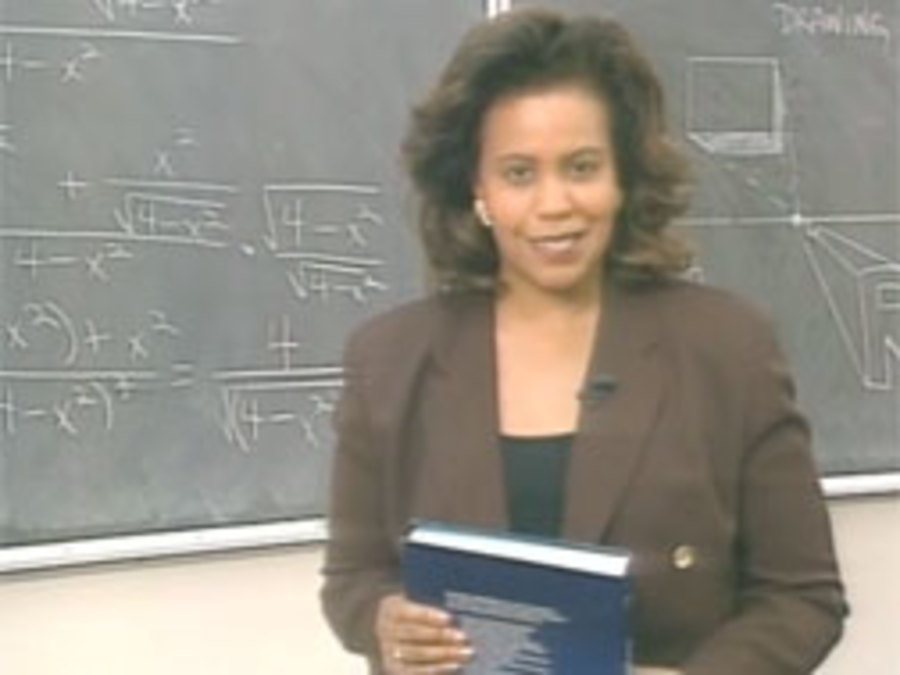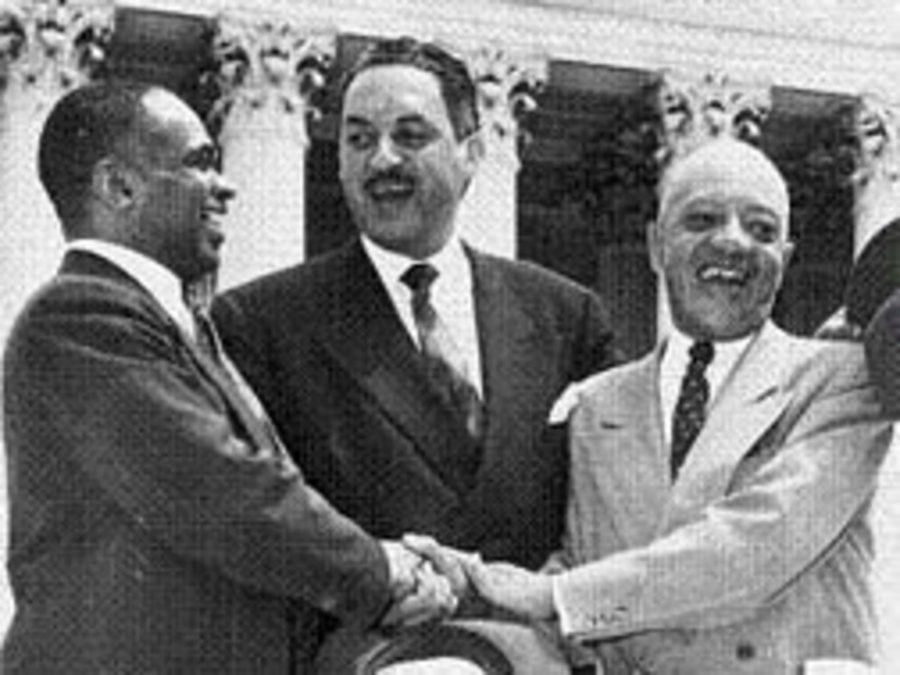On Screen / Anytime - Anywhere
This video contains a television program in two segments that focus on the Oakland Community Learning Center, a project founded by the Oakland, CA, chapter of the Black Panther Party.
- Revolution for Breakfast (Radio show) Jeff Kamen narrates this audio documentary about the Free Breakfast for School Children program put on by the Black Panthers and the Young Lords throughout the United States. Includes interviews with Joan Kelly, national coordinator of the Free Breakfast program; Bobby Rush, Chicago Black Panther Party Minister of Defense; Jimmy Johnson, coordinator of Free Breakfast programs in Southern California; Ronald Tyson, coordinator of the New York City Free Breakfast program; and Louie Nunez, coordinator of the Young Lords' breakfast program. The tape contains a recording of an education session in Kansas City, Missouri, one of the most effective breakfast programs in the country.

- Black America and the Education Crisis The demand for highly educated workers has made high-quality academics the most important challenge facing the U.S. today. In this provocative program, syndicated columnist Juan Williams moderates a town meeting of educators, politicians, and opinion-makers, including the chief-of-staff of the U.S. Department of Education; the presidents of Howard University, the College Board, and the NAACP; and retired NBA all-star Kareem Abdul-Jabbar. Together they discuss issues such as why black children score lower on standardized tests, how to improve academic performance, and Ebonics.
- Black, White & Brown: Brown v. The Board of Education of Topeka Myths, misconceptions, and the march of time have obscured the true origins and legal details of Brown v. The Board of Education. This fascinating program connects viewers with the people, places, events, and ideas that shaped the landmark civil rights case. Interviewees include Cheryl Brown Henderson, daughter of lead plaintiff Oliver Brown; Zelma Henderson, who, until her death in 2008, was the only surviving Brown plaintiff; and the children of other plaintiffs, attorneys, and activists. Civil rights leader Roger Wilkins and other scholars provide additional expertise on the roles played by the NAACP and the U.S. Justice Department.
On paper / in the library
Can We Talk about Race? And Other Conversations in an Era of School Resegregation
Tatum examines some of the most resonant issues in American education and race relations: •The need of African American students to see themselves reflected in curricula and institutions •How unexamined racial attitudes can negatively affect minority-student achievement •The possibilities-and complications-of intimate crossracial friendships Tatum approaches all these topics with the blend of analysis and storytelling that make her one of our most persuasive and engaging commentators on race.
Call number: LC212.62. T38 2007
Pushout: The Criminalization of Black Girls in Schools
Fifteen-year-old Diamond stopped going to school the day she was expelled for lashing out at peers who constantly harassed and teased her for something everyone on the staff had missed: she was being trafficked for sex. After months on the run, she was arrested and sent to a detention center for violating a court order to attend school. Just 16 percent of female students, Black girls make up more than one-third of all girls with a school-related arrest. The first trade book to tell these untold stories, Pushout exposes a world of confined potential and supports the growing movement to address the policies, practices, and cultural illiteracy that push countless students out of school and into unhealthy, unstable, and often unsafe futures.
Call number: LC2731.M59 2016
Invisible Man, Got the Whole World Watching: A Young Black Man's Education
A New York Times Bestseller New York Times Book Review Editor's Choice How do you learn to be a black man in America? For young black men today, it means coming of age during the presidency of Barack Obama. It means witnessing the deaths of Oscar Grant, Trayvon Martin, Michael Brown, Akai Gurley, and too many more. It means celebrating powerful moments of black self-determination for LeBron James, Dave Chappelle, and Frank Ocean. In Invisible Man, Got the Whole World Watching, Mychal Denzel Smith chronicles his own personal and political education during these tumultuous years, describing his efforts to come into his own in a world that denied his humanity. Smith unapologetically upends reigning assumptions about black masculinity, rewriting the script for black manhood so that depression and anxiety aren't considered taboo, and feminism and LGBTQ rights become part of the fight.
Call Number: E185.625 .S635 2016
The Prize: Who's in Charge of America's Schools?
When Mark Zuckerberg announced to a cheering Oprah audience his $100 million pledge to transform the downtrodden schools of Newark, New Jersey, then mayor Cory Booker and Governor Chris Christie were beside him, vowing to help make Newark "a symbol of educational excellence for the whole nation." But their plans soon ran into the city's seasoned education players, fierce protectors of their billion-dollar-a-year system. The growth of charters forces the hand of Newark's school superintendent Cami Anderson, who closes, consolidates, or redesigns more than a third of the city's schools--a scenario on the horizon for many urban districts across America. Russakoff provides a close-up view of twenty-six-year-old Mark Zuckerberg and his wife as they decide to give the immense sum of money to Newark and then experience an education of their own amid the fallout of the reforms. Most moving are Russakoff's portraits from inside classrooms, as homegrown teachers and principals battle heroically to reach students damaged by extreme poverty and violence. The Prize is an absorbing portrait of a titanic struggle, indispensable for anyone who cares about the future of public education and the nation's children.
Call number: LA333.N4 R87 2015
Invisible Men: Mass Incarceration and the Myth of Black Progress
In Invisible Men, sociologist Becky Pettit demonstrates another vexing fact of mass incarceration: most national surveys do not account for prison inmates, a fact that results in a misrepresentation of U.S. political, economic, and social conditions in general and black progress in particular. Invisible Men provides an eye-opening examination of how mass incarceration has concealed decades of racial inequality. Pettit marshals a wealth of evidence correlating the explosion in prison growth with the disappearance of millions of black men into the American penal system. As a result, these men are invisible to most mainstream social institutions, lawmakers, and nearly all social science research that isn't directly related to crime or criminal justice. Invisible Men provides a vital reality check for social researchers, lawmakers, and anyone who cares about racial equality. The book shows that more than a half century after the first civil rights legislation, the dismal fact of mass incarceration inflicts widespread and enduring damage by undermining the fair allocation of public resources and political representation, by depriving the children of inmates of their parents' economic and emotional participation, and, ultimately, by concealing African American disadvantage from public view.
Call number: HV9469.P46 2012
Voices for Diversity and Social Justice: A Literary Education Anthology
An unflinching exploration through poetry, prose, and art of the heart of our educational system--of the segregation, bias, and oppression that are part of the daily lives of so many students and educators. It is also a series of poetical insights into the fights for liberation and resistance at the heart of many of the same students' and teachers' lives. The contributors--youth, educators, activists, others--share what it is like to face discrimination, challenge unjust policy, or subvert monotony by cultivating a vibrant, equitable, revolutionary school environment. This is not a prescriptive text, but instead a call to action. It is a call from many literary voices to create schools where social justice is at the core of education. Stunning in its revelations, Voices for Diversity and Social Justice is an anthology by educators and students unafraid to be passionate about what is missing, what is needed, and what is working in order to make that vision a reality.
Call number: LC212.2.V65 2015
How I Shed My Skin: Unlearning the Racist Lessons of a Southern Childhood
More than sixty years ago, the Supreme Court ruled in Brown v. Board of Education that America's schools could no longer be segregated by race. Critically acclaimed novelist Jim Grimsley was eleven years old in 1966 when federally mandated integration of schools went into effect in the state and the school in his small eastern North Carolina town was first integrated. Until then, blacks and whites didn't sit next to one another in a public space or eat in the same restaurants, and they certainly didn't go to school together. Going to one of the private schools that almost immediately sprang up was not an option for Jim: his family was too poor to pay tuition, and while they shared the community's dismay over the mixing of the races, they had no choice but to be on the front lines of his school's desegregation. What he did not realize until he began to meet these new students was just how deeply ingrained his own prejudices were and how those prejudices had developed in him despite the fact that prior to starting sixth grade, he had actually never known any black people.
Call number: LC212.522.N8 G75 2015
Despite the Best Intentions: How Racial Inequality Thrives in Good Schools
On the surface, Riverview High School looks like the post-racial ideal. Serving an enviably affluent, diverse, and liberal district, the school is well-funded, its teachers are well-trained, and many of its students are high-achieving. Yet Riverview has not escaped the same unrelenting question that plagues schools throughout America: why is it that even when all of the circumstances seem right, black and Latina/o students continue to lag behind their peers? Through five years' worth of interviews and data-gathering at Riverview, Amanda Lewis and John Diamond have created a powerful and illuminating study of how the racial achievement gap continues to afflict American schools more than fifty years after the formal dismantling of segregation. An in-depth study with far-reaching consequences, Despite the Best Intentions revolutionizes our understanding of both the knotty problem of academic disparities and the larger question of the color line in American society.
Call number: LC212.2.L486 2015
Teaching Boys and Young Men of Color: A Guidebook
This guidebook reports on recommendations from a national study of teachers with a proven record of success in teaching boys and young men of color. Recommendations for relationship-building, teaching and learning practices, and classroom management are extended. "This volume provides a compelling array of promising practices that educators can use to enhance the success of Black and Latino males in education. This book transcends previous works on this topic by focusing on what can be done rather than what is wrong. This transition away from deficits and problems to assets and solutions makes Teaching Boys and Young Men of Color a must read." - Tyrone C. Howard, University of California, Los Angeles "Guided by results from their national study of teachers with records of success in educating one of our nation's most underserved populations, Wood and Harris thoughtfully articulate strategies for effectively educating boys and young men of color. Their work provides a compelling rationale for revised and enhanced teaching approaches that account for external pressures, racial and gender identities, stereotypes, and cultural factors that necessitate unique pedagogical practices." - Shaun R. Harper, University of Pennsylvania
Call number: LC2731. W66 2016


